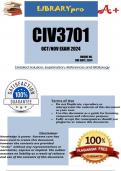CIV3701
OCT/NOV EXAM 2024
UNIQUE NO.
DUE DATE: 2024
, lOMoARcPSD|21997160
Question One
A. ADR processes are dispute resolution processes which serve as an alternative
to litigation. The three ADR processes are namely, negotiation, mediation, and
arbitration. These processes are different to that of litigation in the following
ways: (FIVICOF)
- Flexible- they can be adjusted as per the needs of parties in dispute,
whereas, litigation is most formal, policy and strictly procedure orientated.
- Informal- rules are not fixed and are determined by parties in dispute.
- Voluntary – parties in dispute make a conscious decision to enter into
dispute resolution whereas with litigation the process once taken to court is
solely in the hands of legal representatives.
- Interest- with ADR processes, the interests of the parties in dispute are
highly prioritised opposed to their individual rights as can be seen in
litigation.
- Consent- a decision/outcome/result of the proceedings are consensual,
the latter is reached by mutual agreement of both parties involved, whereas
in litigation, a judgement is imposed on the parties involved impartially and
without their input.
- Future orientated- the outcome of ADR processes seeks to maintain,
sustain and rebuild future relationships amongst the parties involved in the
dispute, whereas in litigation, the outcome is merely to hold the wrongdoer
accountable and impose fair judgement upon the facts of both parties
brought forth to establish a remedy.
B. Small claims courts have become successful in increasing justice for SA
citizens by;
- Creating a more informal setting for South African citizens to utilize
regardless of their social standing and monetary affordability.
- Procedures are simplified opposed to the bigger courts, resolutions are
speedy with minimal waiting periods.
- Costs are also minimal and affordable.
- Seeking and administration of justice is more accessible.
- It is fast, efficient and aids and assists in resolving minor disputes.
2




